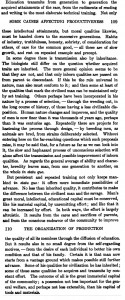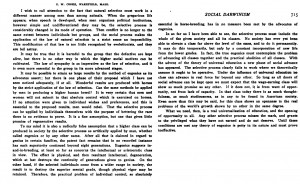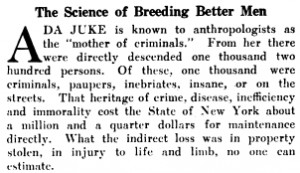Kennedy’s address at the 97th annual meeting of the American Psychiatric Association in 1941 encapsulates well how the acceptance of evolution and utilitarian thinking are tied into arguments for eugenics (and euthanasia), which is ironic, of course, since many advocates for euthanasia deny such connections and modern proponents of evolution become apoplectic at the insinuation …
Category: breeding horses or cattle
Charles Galton Darwin: “Unconscious Selection”
From Charles Galton Darwin’s The Next One Million Years: [civilization has the tendency] to eliminate its ablest people. This has happened in the past, and is certainly happening now, and if it is always to happen, it signifies a recurrent degeneration of all civilizations, only to be renewed by the incursion of barbarians who have …
Taussig: The breeding of men, eugenics, and progress. 1911
SOURCE: Frank Taussig, Principles of Economics, Volume II, 1911. Pages 233-237. This movement is steadily extending, and is gradually affecting not only those who are usually thought of as being in a more special sense “native born,” but the descendants of the immigrants as well. The influence of free institutions and of free opportunities is …
Universal Education a Pre-Requisite for Effective Eugenics Policies
Source: G.W. Cooke, discussing ‘Social Darwinism’ in American Journal of Sociology 12 (March 1907), 714-715. Below the image is OCR scanned text. If anyone would like to send a cleaned edition, that would be greatly appreciated. I wish to call attention to the fact that natural selection must work in a different manner among men …
Richard Dawkins: Eugenics may not be bad
People who advance ‘eugenic’ ideas while trying to assert that what they are proposing is not ‘eugenics’ at all, but rather a straight-forward inference from evolutionary science, fail to understand that the eugenicists themselves believed they were simply making a straight-forward inference from Darwinism. And, indeed, it is a straight-forward inference, which is why so …
Scientific American: “The Science of Breeding Better Men” 1911
Editorial from a 1911 edition of Scientific American [Source]: Sci-Am’s Editor’s note: This editorial was written and published in 1911. Although our editors of a century ago pondered some lofty aspirations for the orderly future of humans, it was only three decades later that the brutal reality of a Nazi social order suffused with a …
Charity a Hindrance to Natural Selection
In the following foreword from a compilation of 12 eugenic lectures (1914), we see that eugenics is perceived as merely applied evolution. Furthermore, ‘modern man,’ being a sympathetic being, keeps alive those that should die. With luck, principles of breeding already used with animals will be brought to bear on humans. ——————- Foreword by Lewellys …
Francis Galton Coins the Word ‘Eugenics’ as the Science of Better Breeding: Men, Brutes, and Plants. Quote of the Day
A little known fact is that eugenics was seen as the application of principles of heredity, in particular those principles as understood by Darwin. In this excerpt, Francis Galton (Darwin’s cousin), coins the word eugenics and explicitly refers to it as a science. The principles of heredity thus applied, he says, are “applicable to men, …
The Duty of the State in the Treatment of the Deformed: R. Z. Mason, Appleton WI, 1879
R.Z. Mason, mayor of Appleton, WI, “The Duty of the State in its Treatment of the Deaf and Dumb, the Blind, the Idiotic, the Crippled and Deformed, and the Insane.” [Source / Italics added, bold text added] In the progress of modern civilization, the state has come slowly to a recognition of certain duties and …
- 1
- 2




Recent Comments